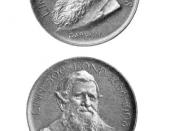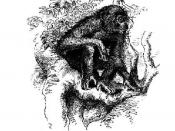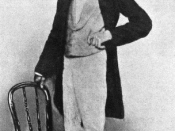"Wallace's reputation is less than his scientific achievements merit.
What arguments can be used to support or contest this theory?"
By the turn of the century Alfred Russel Wallace was very probably Britain's most known naturalist. By the end of his life, moreover, He may well have owned; based on evidence gleaned from contemporary sources, one of the world's most recognised names. But the question remains, is it Wallace's status as a noted scientist or his reputation as an anti-establishment radical that he is remembered for? The answer to this question can be argued either way, it is well recorded that Wallace played a large part in science and indeed Victorian society, and by many people he was very much respected, and It cannot be denied that Wallace achieved much in his lifetime.
Between the years 1898 and 1910, Wallace managed to produce well over four thousand pages of monographic writings.
Despite his radical associations and links with spiritualism, he was well honoured in his lifetime; and would most likely have been more so had he not made it clear early on that he was not particularly interested in receiving honoraria. He was awarded honorary doctorates from the University of Dublin in 1882 and Oxford University in 1889, and important medals from the Royal Society, the Société de Geographie and the Linnean Society. He even received the order of merit from the crown in 1908, quite an honour for a man with a reputation such as his. He reluctantly became a member of the Royal Society in 1893, and at one time or another had professional affiliations with the Royal Entomological Society, British association for the advancement of science, Batavian Society of Arts and Sciences, British National Association of Spiritualists, Land Nationalisation Society, Anti-Vaccination League, and several lesser...


